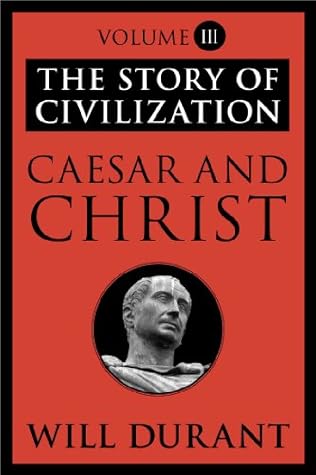More on this book
Community
Kindle Notes & Highlights
The day had begun to smile cheerily, and the sun was already brightening the tops of the hills, when a band of men, in arms and appearance pirates, having ascended the summit of a slope that overlooks the Heracleotic mouth of the Nile, paused and surveyed the sea. Finding no sail there to promise them booty, they turned their eyes to the shore beneath them; and this is what they saw.
Cras amet qui numquam amavit, quique amavit eras amet.
Everywhere in the Empire city walls were being built, signifying the weakening of the imperial power and the end of the Roman peace.
He informed a skeptical army and Senate that it was the god, and not their choice or confirmation, that had made him Emperor.
Monarchy and monotheism were advancing side by side, each seeking to make the other its aide.
The army resented this sublimation, murdered him (282), mourned him, and built a monument to his memory.
Augustus had created the Empire, Aurelian had saved it; Diocletian reorganized it.
It was a brilliant arrangement, which had every virtue but unity and freedom.
Byzantinism began with Diocletian.
The bureaucrats found their task too great for human integrity, their surveillance too sporadic for the evasive ingenuity of men.
When Maximian urged him to return to power and end the strife, he replied that if Maximian could see the excellent cabbages he was growing in his garden he would not ask him to sacrifice such content for the pursuit and cares of power.
Confronted by enemies on every side, the Roman state did what all nations must do in crucial wars; it accepted the dictatorship of a strong leader, taxed itself beyond tolerance, and put individual liberty aside until collective liberty was secured.
The Diocletian persecution was the greatest test and triumph of the Church. It weakened Christianity for a time through the natural defection of adherents who had joined it, or grown up, during a half century of unmolested prosperity.
Acta Martyrum,
“The blood of martyrs,” said Tertullian, “is seed.”
Caesar and Christ had met in the arena, and Christ had won.
en toutoi nika—“in this sign conquer.”
Mithraic-Aurelian banner of the Unconquerable Sun,
“it is Fortuna that makes a man emperor”
Three clouds softened the brilliance of this “cloudless day”: the monastic secession, the Donatist schism, the Arian heresy.
While Christianity converted the world, the world converted Christianity, and displayed the natural paganism of mankind.
“Religion,” wrote Lactantius, “must by its very nature be untrammeled, unforced, free”
fourteen centuries, of European life and thought. Perhaps, if we except Augustus, the grateful Church was right in naming him the greatest of the emperors.
“THE two greatest problems in history,” says a brilliant scholar of our time, are “how to account for the rise of Rome, and how to account for her fall.”
A great civilization is not conquered from without until it has destroyed itself within. The essential causes of Rome’s decline lay in her people, her morals, her class struggle, her failing trade, her bureaucratic despotism, her stifling taxes, her consuming wars.
ipsa clausula saeculi—literally the fin de siècle or end of an era—
The cause, however, was no inherent exhaustion of the soil, no change in climate, but the negligence and sterility of harassed and discouraged men.
the ablest men married latest, bred least, and died soonest.
The dole weakened the poor, luxury weakened the rich; and a long peace deprived all classes in the peninsula of the martial qualities and arts.
Rome was conquered not by barbarian invasion from without, but by barbarian multiplication within.
Christ’s victory had been Rome’s death.
It was because Rome was already dying that Christianity grew so rapidly. Men lost faith in the state not because Christianity held them aloof, but because the state defended wealth against poverty, fought to capture slaves, taxed toil to support luxury, and failed to protect its people from famine, pestilence, invasion, and destitution;
Rome was not destroyed by Christianity, any more than by barbarian invasion; it was an empty shell when Christianity rose to influence and invasion came.
The political causes of decay were rooted in one fact—that increasing despotism destroyed the citizen’s civic sense and dried up statesmanship at its source.
The Senate, losing ever more of its power and prestige after Pertinax, relapsed into indolence, subservience, or venality; and the last barrier fell that might have saved the state from militarism and anarchy.
The Roman state committed a thousand political crimes; it built its edifice upon a selfish oligarchy and an obscurantist priesthood; it achieved a democracy of freemen, and then destroyed it with corruption and violence; it exploited its conquests to support a parasitic Italy, which, when it could no longer exploit, collapsed.
Today our highest labors seek to revive the Pax Romana for a disordered world.
Within that unsurpassed framework Rome built a culture Greek in origin, Roman in application and result.
The south has created the civilizations, the north has conquered and destroyed or borrowed them.
Latin was, till the eighteenth century, the Esperanto of science, scholarship, and philosophy in the West; it gave a convenient international terminology to botany and zoology;
The reins and skills of government were handed down by a dying empire to a virile papacy; the lost power of the broken sword was rewon by the magic of the consoling word; the armies of the state were replaced by the missionaries of the Church moving in all directions along the Roman roads; and the revolted provinces, accepting Christianity, again acknowledged the sovereignty of Rome.


